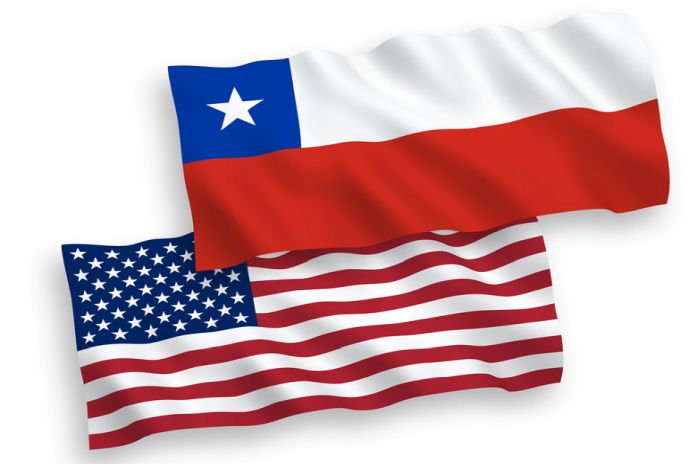- The text of the following statement was released by th egovernments of the United States of America and Chile on the occasion of meetings to review implementation of the Free Trade Agreement Environment Chapter and Environmental Cooperation Agreement.
CHILE / USA – On October 29 and 30, 2024, in Santiago, Chile, the governments of Chile and the United States held the tenth meeting of the Environmental Affairs Council (EAC) under the Chile – United States Free Trade Agreement (FTA) and the eighth meeting of the Joint Commission for Environmental Cooperation (JCEC) under the Chile – United States Environmental Cooperation Agreement (ECA).
Marcela Otero, director-general of multilateral economic affairs, ministry of foreign affairs, and Julio Cordano, director of environment, climate change and oceanic affairs, ministry of foreign affairs, co-chaired the meetings for Chile. Kelly Milton, assistant US trade representative for environment and natural resources, office of the United States trade representative, and Jennifer R. Littlejohn, acting assistant secretary, bureau of oceans and international environmental and scientific affairs, US Department of State, co-chaired the meetings for the United States.
The EAC reviewed the Parties’ respective efforts to implement the obligations under the Environment Chapter (Chapter 19) of the FTA by exchanging information regarding recent actions each Party has taken to (1) establish high levels of environmental protection; (2) effectively enforce environmental laws and regulations; and (3) provide opportunities for public participation with respect to the implementation of the Environment Chapter.
Chile presented its work to improve levels of environmental protection, including the development of the national regulation for climate change, policies to reduce the impacts of plastic pollution, and a sectoral approach to a national-level circular economy. Additionally, Chile reported on work under the implementation of the Escazú Agreement and the second version of the National Action Plan on Business and Human Rights.
The United States highlighted recent actions to improve US levels of environmental protection, including progress on the implementation of the Bipartisan Infrastructure and Inflation Reduction Acts to advance US climate goals, as well as updates made to the Endangered Species Act to strengthen the protection and recovery of threatened and endangered species. The United States also reported on recent actions by US federal agencies to effectively enforce environmental laws and discussed ongoing and future opportunities to engage on trade-related climate measures, particularly through the Americas Partnership and at the WTO.
During the EAC, Chile and the United States also exchanged information regarding efforts to: tackle the climate crisis; strengthen marine species conservation, including through combating illegal, unreported and unregulated (IUU) fishing; promote circular economy approaches, including related to waste management and plastic pollution; and combat wildlife trafficking and support the implementation of the Convention on International Trade in Endangered Species of Wild Fauna and Flora (CITES).
The JCEC reviewed environmental cooperation projects completed and ongoing under the 2021-2024 Work Program. Chilean and US agencies reported on activities such as workshops related to the protection and management of protected areas and cooperation activities with Indigenous communities; the design of a fire prevention, mitigation, and investigation program; exchanges related to combating wildlife trafficking; strengthening public participation in the environmental impact assessment process; and training environmental enforcement officials.
The JCEC also acknowledged and discussed future cooperation under the Eighth Work Program for Environmental Cooperation for 2025-2028, which establishes the following priorities for cooperative activities: strengthening effective implementation and enforcement of environmental laws and regulations; promoting sustainable management of natural resources and biodiversity; enhancing environmental education and civil society participation in environmental decision-making; and improving air and water quality through effective policies and innovative technologies for increased climate resilience.
Chile and the United States intend to build upon previous environmental cooperation work and intensify their focus on certain priorities, such as combating wildlife trafficking and IUU fishing; addressing pollution, including air and plastic pollution; improving water management and drought resilience; tackling the climate crisis; and advancing environmental justice through their respective domestic laws, regulations, and policies.
A public session took place on October 30 per the FTA Environment Chapter and the ECA. Broad participation from diverse civil society and industry sectors reflected both countries’ commitment to maintaining an open dialogue and participatory process. Both delegations informed the public about implementing the Environment Chapter and ongoing and future environmental cooperation under the ECA. The session allowed members of the public to offer comments and ask questions, both in person and online.
Finally, Chile and the United States signed the 2025-2028 Work Program for Environmental Cooperation, reaffirming their dedication to preserving and protecting the environment through implementation of the FTA Environment Chapter and the Environmental Cooperation Agreement.
Chile’s delegation included officials from the ministry of foreign affairs, the ministry of environment, the undersecretariat of fisheries, the national service of fisheries, the national forestry corporation, the environment superintendence, the metropolitan park, national custom service, agriculture and livestock service, and the office of agricultural studies and policies.
The United States delegation included officials from the department of state, the office of the US trade representative, environmental protection agency, department of the interior, national oceanic and atmospheric administration, and US forest service.





